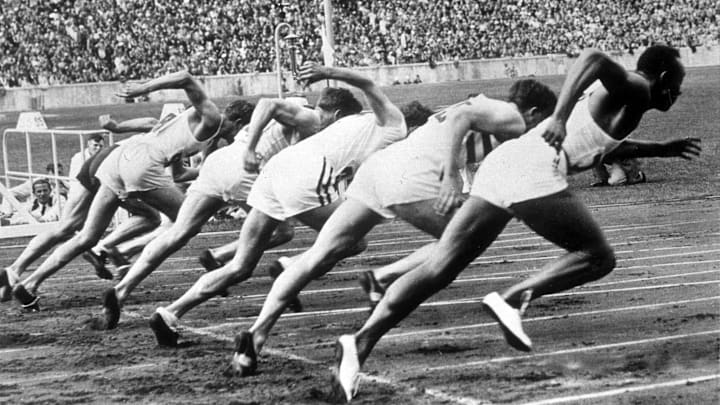The 1936 Olympic Games in Berlin, hosted by a freshly appointed Adolf Hitler, were filled with historic moments in both sports and geopolitics. It was the first Olympic Games to be the subject of a documentary film, Olympia, shot by Triumph of the Will director Leni Riefenstahl. It was also the first to introduce the now ubiquitous ritual of the torch relay, with bearers carrying a burning flame from Greece’s Mount Olympus.
Perhaps the most famous incident occurred after Jesse Owens, a track star from Alabama, took the gold in the 200-meter sprint. Hitler, whose National Socialist Party championed Aryan racial supremacy, clearly wasn’t too happy seeing the Black athlete wipe the floor with his white competitors, and when the International Olympic Committee told the Führer he could either congratulate all the day’s winners or none, Hitler opted to leave the stadium.
His decision set the tone for the rest of the Games, with Owens going on to win gold in the 100-meter sprint, long jump, and relay—achievements that can all be viewed below.
After Owens was given a gold medal for the 100-meter sprint, Hitler ignored the IOC’s directions by shaking hands with all of the winners except Owens, whom the Games’ official website now refers to as perhaps the single greatest Olympic athlete of all time. (Owens’s record-setting four-gold tally wasn’t matched until American track athlete Carl Lewis won the gold in the same four events in the 1984 Summer Games in Los Angeles.)
Almost a century later, the story of Owens’s athletic performance in Berlin making a mockery of Nazi racist ideology is familiar. Fewer may be aware of what Owens’ victories meant for the United States, a country where Black Americans were still legally treated as second-class citizens.
“A triumph fantasized by virtually every athlete, those medals became Owens's magical key to unlocking the door to the American Dream,” historian Joseph Boskin wrote in the journal Reviews in American History. “Yet, at the same time, they were fool's gold, dragging him down into unremitting frustration. Although they were constantly polished by an adulatory public, the medals never brought him what he most desired”—namely, respect, financial security, and equality.
Owens himself would later state that he was less offended by Hitler’s unwillingness to shake his hand than he was by President Franklin Roosevelt’s refusal to receive him and the other Black Olympians at the White House, an honor which—due to Roosevelt’s reliance on Southern voters in the upcoming elections—was extended only to white athletes.
It wasn’t until 1976, four decades years after the Olympic Games, that Owens was welcomed by an American president, Gerald Ford. This time, at least, Owens received an arguably more valuable award for his performance in Berlin: the Presidential Medal of Freedom.
